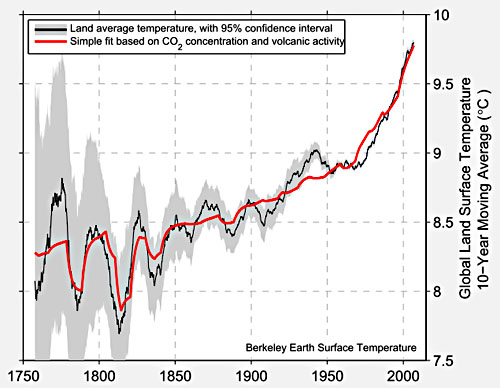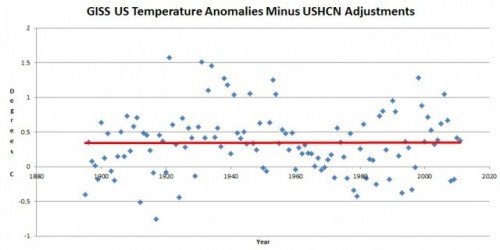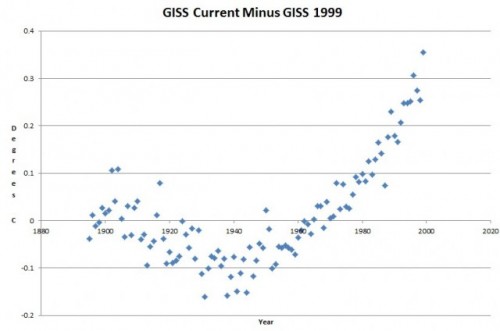Kevin Drum approvingly posted this chart from Muller:

I applaud the effort to match theory to actual, you know, observations rather than model results. I don’t have a ton of time to write currently, but gave some quick comments:
1. This may seem an odd critique, but the fit is too good. There is no way that in a complex, chaotic system only two variables explain so much of a key output. You don’t have to doubt the catastrophic anthropogenic global warming theory to know that there are key variables that have important, measurable effects on world temperatures at these kind of timescales — ocean cycles come to mind immediately — which he has left out. Industrial-produced cooling aerosols, without which most climate models can’t be made to fit history, are another example. Muller’s analysis is like claiming that stock prices are driven by just two variables without having considered interest rates or earning in the analysis.
2. Just to give one example critique of the quality of “science” being held up as an example, any real scientist should laugh at the error ranges in this chart. The chart shows zero error for modern surface temperature readings. Zero. Not even 0.1F. This is hilariously flawed. Anyone who went through a good freshman physics or chemistry lab (ie many non-journalists) will have had basic concepts of errors drilled into them. An individual temperature instrument probably has an error when perfectly calibrated of say 0.2F at best. In the field, with indifferent maintenance and calibration, that probably raises to 0.5F. Given bad instrument sitings, that might raise over 1F. Now, add all those up, with all the uncertainties involved in trying to get a geographic average when, for example, large swaths of the earth are not covered by an official thermometer, and what is the error on the total? Not zero, I can guarantee you. Recognize that this press blitz comes because he can’t get this mess through peer review so he is going direct with it.
3. CO2 certainly has an effect on temperatures, but so do a lot of other things. The science that CO2 warms the Earth is solid. The science that CO2 catastrophically warms the Earth, with a high positive feedback climate system driven to climate sensitivities to CO2 of 3C per doubling or higher is not solid. Assuming half of past warming is due to man’s CO2 is not enough to support catastrophic forecasts. If half of past warming, or about .4C is due to man, that means climate sensitivity is around 1C, exactly the no-feedback number that climate skeptics have thought it was near for years. So additional past man-made warming has to be manufactured somehow to support the higher sensitivity, positive feedback cases.
Judith Curry has a number of comments, including links to what she considers best in class for this sort of historic reconstruction.
Update: Several folks have argued that the individual instrument error bars are irrelevant, I suppose because their errors will average. I am not convinced they average down to zero, as this chart seems to imply. But many of the errors are going to be systematic. For example, every single instrument in the surface average have manual adjustments made in multiple steps, from TOBS to corrections for UHI to statistical homogenization. In some cases these can be calculated with fair precision (e.g. TOBS) but in others they are basically a guess. And no one really knows if statistical homogenization approaches even make sense. In many cases, these adjustments can be up to several times larger in magnitude than the basic signal one is trying to measure (ie temperature anomaly and changes to it over time). Errors in these adjustments can be large and could well be systematic, meaning they don’t average out with multiple samples. And even errors in the raw measurements might have a systematic bias (if, for example, drift from calibration over time tended to be in one direction). Anthony Watt recently released a draft of a study I have not read yet, but seems to imply that the very sign of the non-TOBS adjustments is consistently wrong. As a professor of mine once said, if you are unsure of the sign, you don’t really know anything.


